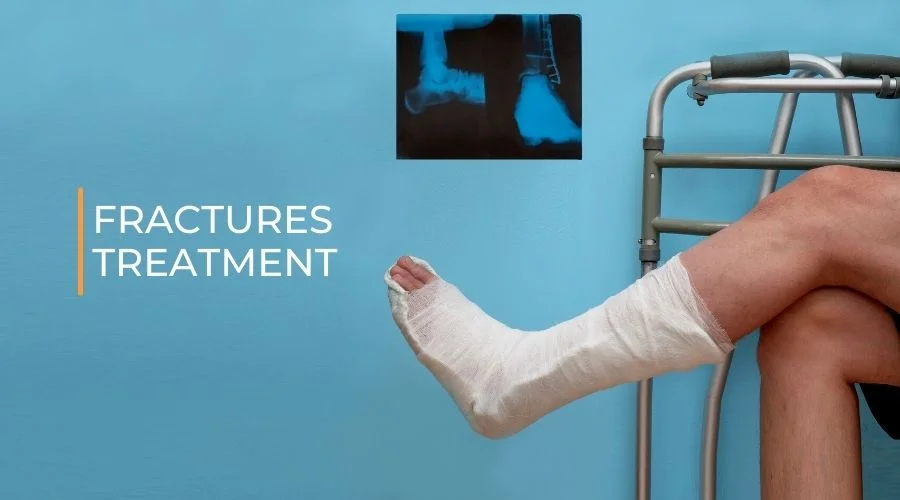Fractures Treatment
Home / Fractures TreatmentFractures Treatment in Delhi

Fractures are painful and restrict your body movement to a large extent but fractures heal well and you can get back to your normal after some time.
Usually, fractures occur due to injury in common day to day activities like slip and fall, sports, car accident, fall from high, etc. But there are medical conditions that attribute to fractures like Osteoporosis, Cancer/osteomyelitis.
The best judge of your fracture is your orthopedic doctor. He will examine the fracture location, its severity and determine the type of treatment required. In severe cases, surgery might be required to treat the fracture.
Fracture Symptoms
When there is a fracture you may hear or feel a snap or a grinding noise when the injury occurs. There may be swelling, bruising, or pain around the injured area. You may feel pain when you place, touch, push, or move the wound.
Some common symptoms of fracture are –
- Severe pain in the bone
- Out-of-place, deformity in the body part or joint
- Pain in moving or using the injured body part or nearby areas.
- Cannot bear weight
- Swelling in the injured area
- Discomfort, bruising, or redness in the injury part

Causes
Most fractures are caused by violent falls, car accidents, or sports injuries. Other causes include low bone density and osteoporosis, which weaken bones. Overstressing your bones like hands or legs can cause stress fractures, which are very small fractures.
It is important to have healthy bones that are extremely sturdy and durable and can withstand astonishingly strong impacts. If there are any fractures, you should see a doctor immediately.
The most common causes of fractures are:
- Injuries- A fall, a car accident, or being caught in a football game can cause fractures;
- Osteoporosis- This condition weakens the bones and makes them more likely to break.
- Overuse- Repetitive exercise can fatigue muscles and increase stress on bones.
Prevention
You can prevent many fractures by avoiding falls, staying healthy, and taking the right vitamins and minerals.
- Preventing falls- If you follow certain tips, you can stay upright indoors and outdoors.
- Remove debris-keep the room clean. Make sure that cables and wires do not pass through any channels.
- Lighting-Ensure that all rooms are well lit.
- Shoes: Wear shoes at home, not just socks.
- Balance: Use a cane or crutches and wear rubber-soled shoes for better traction. If necessary, use a stick or walker.
- Curbs: Be careful of curbs. Pay attention to balance when lifting.
- Keep ice and snow away from sidewalks, driveways, and steps.
- Consume chickpeas, black beans, and fermented tofu products such as milk and yogurt; eggs; vegetables such as broccoli, spinach, and whole grains such as brown rice, and oats.
Physiotherapy Treatment For Fractures
If you have suffered a fracture, you need to consult a physiotherapist for reducing your pain and quick recovery. The role of physical injury is very crucial in case of fracture. Physiotherapy helps in regaining bone and muscle strength. It also helps in restoring the movement of the affected body and its connected joints and muscles.
The time required to fully recover from a fracture is 4-8 weeks, depending on the fracture. It is important to start physical therapy as soon as possible after the doctor has allowed it.
Our physiotherapists will work on weakness and swelling on the affected and adjacent joints. The physiotherapy treatment depends on the type and location of the fracture. Our physical therapist will also work on balance and control. The physical therapist will guide you on how to carry weights, and you will gradually move forward in your daily activities.
Every fracture is different, and so is the healing time. When you visit us, we will develop a personal treatment plan after carefully evaluating the fracture area.
After the assessment, we will let you know how long your rehabilitation plan will last. The physio will study the negative effects of long-term fixation resulting in decreased functional activity.
Specific joint exercises can reduce swelling and restore full muscle strength and mobility. We will start treating pain and swelling. You can also prescribe ice therapy and electrotherapy. Stretching exercises and hot packs are used to increase joint flexibility. Weights, resistance bands and EMS are used to increase strength. This will reduce stiffness and normalize the use of severed limbs.
In the case of scar healing, soft tissue release and stretching technique are implemented. All these exercises and techniques must be done under the supervision of a qualified physical therapist.
Quick Enquiry
Send us a message with your contact details and one of our staff will contact you right away.
TREATMENTS
BOOK AN APPOINTMENT
GENERAL ENQUIRIES
235, Avtar Enclave,Paschim Vihar,Delhi – 110063
ACL Treatment FAQ’s
Both are the same. A fracture occurs when your bone loses integrity.
Most fractures heal within 6 to 10 weeks, but this depends on many other factors and varies from person to person. Hand and wrist fractures usually take 4 to 6 weeks to heal, while tibia fractures can take 20 weeks or more.
If you have suffered a fracture, you should avoid high sugar or salt items, red meat, alcohol, and caffeine. If you smoke, your healing will take much longer.
Fractures usually heal on their own, but they can problems like joint stiffness, muscle weakness, tendon problems, and nerve damage. Physiotherapy involves putting more time to heal the injured soft tissue for reducing pain and in quick recovery.
When you reach the two-three week mark and your orthopedic doctor is satisfied with the healing of the fracture part, they will approve you for physical therapy.
